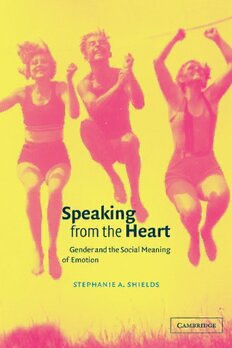
Gender and the social Meaning of Emotion PDF
23 Pages·2002·0.228 MB·English
Most books are stored in the elastic cloud where traffic is expensive. For this reason, we have a limit on daily download.
Preview Gender and the social Meaning of Emotion
Description:
Who is called "emotional"? And what does it mean? How do we know that a person is "speaking from the heart"? The prevailing stereotype is that she is emotional, while he is not. In Speaking From the Heart, Stephanie Shields uses examples from everyday life, contemporary culture and the latest research to illustrate how culturally shared beliefs about emotion are used to shape our identities as women and men and she exposes the historically shifting and tacit assumptions these beliefs are based on. Everything from nineteenth century ideals of womanhood, to baseball and the new man is considered in the context of how emotion effects our everyday lives. Shields argues that the question of anger is the fundamental paradox in the emotional female/unemotional male stereotype: the stereotype of emotionality is female, but the stereotype of anger, a prototypic emotion, is male. Why is it that anger, which is so often portrayed as childish (peevish, irritable, testy, sullen, cranky, touchy, irked), and the essence of the apparently uncontrollable, irrational character of emotion, is masculine? Is there a difference (either conceptually or behaviorally) between masculine anger and the anger of immature tantrums? Is anger, in fact, viewed as emotionality when displayed or experienced by adult men? Stephanie A. Shields is Professor of Psychology and Women's Studies at The Pennsylvania State University. She served as Director of Women's Studies at the University of California, Davis and more recently at Penn State. Her research and numerous articles address the intersection of the psychology of emotion, the psychology of gender and feminist psychology. This is her first book.
See more
The list of books you might like
Most books are stored in the elastic cloud where traffic is expensive. For this reason, we have a limit on daily download.
